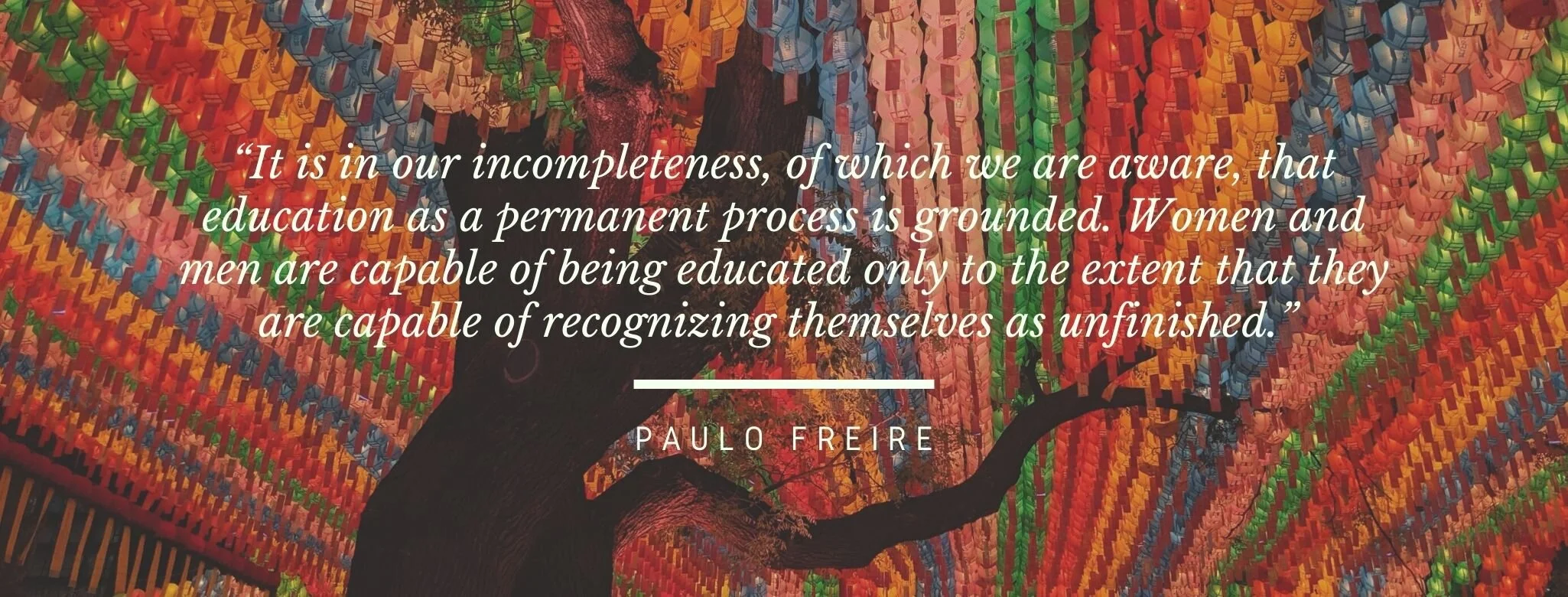Social Justice and Social Change
From Freedom Rides to Ferguson: Narratives of Nonviolence in the American Civil Rights Movement
Dr. Bernard LaFayette, Jr. | Emory University
The Modern Civil Rights Movement is a significant landmark in United States history. This movement was a struggle for human rights directly challenging the nation to extend its democratic principles to African Americans and all peoples. This course sheds light on the often overlooked strategic planning that supported the direction of the events and is told by a voice intimately involved in the organization of movement—Dr. Bernard LaFayette, Jr. Topics include the history of the campaigns, the different coalitions and groups, philosophy and methods of nonviolent direct action, and the contemporary application of nonviolent conflict transformation. The course hosts several guest speakers, including Andrew Young, Reverend C.T. Vivian, Henry "Hank" Thomas, and Constance Curry.
Feminism and Social Justice
Dr. Bettina Aptheker | University of California, Santa Cruz
"Feminism and Social Justice" is an adaptation of Distinguished Professor Bettina Aptheker's long-running course at UC Santa Cruz. In the course, Professor Aptheker presents a broad definition of feminism that serves to frame three significant events in the history of feminism and social justice: the Empire Zinc strike of 1951, the 1971-1972 trial of Angela Davis, and the #metoo Movement.
Anti-Racism I
Drs. Shawn O’Neal and Jennifer Ho | University of Colorado, Boulder
Anti-Racism I is an introduction to the topic of race and racism in the United States. The primary audience for this course is anyone who is interested in learning about race/racism in the US who has never taken a course in critical race or ethnic studies or affiliated fields (indeed, who may not know what the fields of critical race studies or ethnic studies are), who has never read a book about race/racism, or attended any race equity or diversity trainings on the topic of race/racism.
Race and Cultural Diversity in American Life and History
Dr. James D. Anderson | University of Illinois, Urbana-Champaign
Learners will deepen their understanding and appreciation of ways in which race, ethnicity and cultural diversity have shaped American institutions, ideology, law, and social relationships from the colonial era to the present. Race and ethnicity are ideological and cultural categories that include all groups and individuals. Hence, this course is designed in significant part to take a broad look at the ideology of race and cultural diversity in America’s past and present. The primary focus is on the historical and social relationships among European Americans, Native Americans, African Americans, Latino/as, and Asian/Pacific Americans. Issues of race and ethnicity are examined across different ethno-cultural traditions in order to interweave diverse experiences into a larger synthesis of the meaning of race and ethnicity in American life. In this course, we conceive of “race” and “diversity” as references to the entire American population, even as we recognize that different groups have unique historical experiences resulting in distinctive and even fundamental cultural differences. We treat race and ethnicity as dynamic, complex ideological and cultural processes that shape all social institutions, belief systems, inter-group relationships, and individual experiences.
Gender, Family, and Social Change in Contemporary South Korea
Drs. Hyun Mee Kim and Yoo Theodore Jun | Yonsei University
This course examines the transformation of Korean society beginning around the turn of the 20th century to contemporary times. In particular, it explores how shifting categories of masculinity, and by contrast, femininity have impacted upon, and in turn been influenced by social, cultural, and political change. Using multiple disciplinary lenses, we will critically examine how gender intersects with political, social, and economic developments starting with the Confucianization of Korean society during the Joseon Dynasty (1392-1910) up to the contemporary moment of globalization and neoliberal reform. The class will draw on a variety of topics such as traditional views of women, religion, race, class, education, patriarchy, sexuality, imperialism, modernity, war, globalization, the diaspora, among others. Special attention will be placed on the historical, transnational and transdisciplinary connections.
Understanding Korean Politics
Dr. Chung-in Moon | Yonsei University
This course will select six most outstanding issues in contemporary Korean politics and will engage in an in-depth, interactive inquiry of those issue. They include Korean politics in history, institutional setting of Korean politics, and dynamics of political culture in Korea, profiles of political leadership, myth and reality of the developmental state and the Korean economic miracle, and debates on Korean unification. The course will expose students to contending theories and empirical reality at first hand.
Well-Being
The Science of Well-Being
Dr. Laurie Santos | Yale University
In this course you will engage in a series of challenges designed to increase your own happiness and build more productive habits. As preparation for these tasks, Professor Laurie Santos reveals misconceptions about happiness, annoying features of the mind that lead us to think the way we do, and the research that can help us change. You will ultimately be prepared to successfully incorporate a specific wellness activity into your life.
Meditation: A way to achieve your goals in your life
Dr. Duck-Joo Lee | Korean Advanced Institute of Science and Technology (KAIST)
Do we truly think that we have lived for ourselves? Perhaps we have lived for money, love, fame, family and pride etc.? Therefore, we don’t seem to be satisfied even though we are full of those things. It is because that we don’t know ourselves. Eric Fromm talked about human nature as two modes of being: “To Have” and “To Be”. If we are “Having” the nature of possessions, we are not satisfied, and feel empty and futile. Then, how can we be “Being” the nature of our inner-selves? Sometimes, we happened to be aware of this “Being” nature and try to change ourselves, but fail. But, because of our daily routines, it’s easily forgotten. And more it is hard to escape from our unwanted minds controlling us. From now on, let us reflect on ourselves and look at our minds leading up to today! Don’t we achieve our goals after knowing ourselves? And let us find the “Being” nature of our original selves after escaping from the minds restraining and controlling us. In this lecture, the definition and principle of the mind are explained in simple and clear ways. You can make sure and practice the methodology of finding the true original mind of inner-self by escaping from the false mind of possession.
Self-reflection is the first step to meditate. You can know yourselves most objectively through meditation and you will realize that all the thoughts and actions are due to your minds which are nonexistent and false. If you throw away the false mind, you will find the true mind. Meditation is now world-wide sensation. There are many research reports that show people can be leaders if you have a habit of self-reflection through meditation. Now meditation at school and the workplace are popular. Happiness is having no worries. You can really relax yourself if there is no bundle of thoughts and you can be successful when you know yourself truly. Worries come from the memorized thoughts of the false mind. Your inner potential of positive power are revealed, your peaceful and happiest mind will be in your mind, and you can live the life you wanted through meditation. This method of meditation is very practical and everybody can follow the methodology. As an engineer, I will guide you step by step to practice this meditation. I am sure that this lecture becomes a turning point in your life.
Mind Control: Managing Your Mental Health During COVID-19
Dr. Steve Joordens | University of Toronto
Never in the history of humanity have so many people been feeling intense anxiety related to COVID-19 and the world it will leave in its wake. The intent of this course is to give you a deeper understanding of the anxiety reaction as it relates to various aspects of our current life, ranging from our consumption of news to the way we talk to our children about this. I will also give you clear strategies for managing and, in fact, turning off the anxiety response at least for short periods. My sincere hope is that you will leave this course with a better understanding of how your brain reacts to crises, along with some powerful tools for managing it before it manages you.
Korean Language
Learn to Speak Korean 1
Dr. Dang Mee Han | Yonsei University
This course is for beginner students who are familiar with the Korean alphabet, Hangeul. Through this course students will learn the skills essential for daily interactions with Koreans while living in Korea. This course consists of six modules, and each module is composed of five units. Each unit has vocabulary, grammar and expressions, conversation practice, video clips, quizzes, a workbook, and vocabulary lists. In order to assist students with their independent studies, Korean learning materials such as lecture notes, workbooks, and vocabulary lists detailing each day’s lecture are also provided. The vocabulary lists are accompanied by English, Chinese, and Japanese translations. I hope that you enjoy all this program has to offer over the next six weeks. After studying in this program, you will be able to have a real Korean conversation with your newly acquired knowledge of the Korean language.
First Step Korean
Dr. Seung Hae Kang | Yonsei University
This is an elementary-level Korean language course, consisting of 5 lessons with 4 units, and covers 4 skills: reading, writing, listening and speaking. The main topics include basic expressions used in everyday life, such as greetings, introducing yourself, talking about your family and a daily life and so on. Each lesson covers dialogues, pronunciation, vocabulary, grammar, quizzes and role-plays.
Learn Korean
Hyung Eun Min | Korean Cultural Center of New York
Learn to speak, read, and write Korean in teacher-led video classes. Learn about Korean culture, practice your pronunciation, and ask questions from a native Korean speaker!













